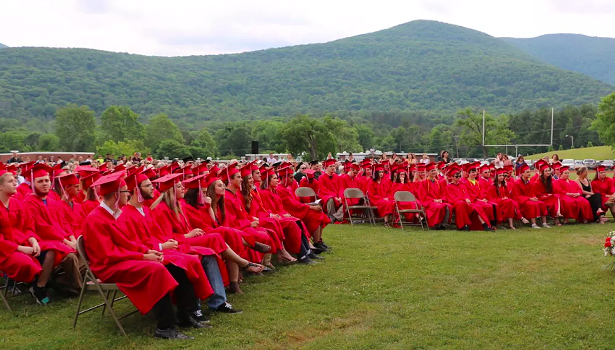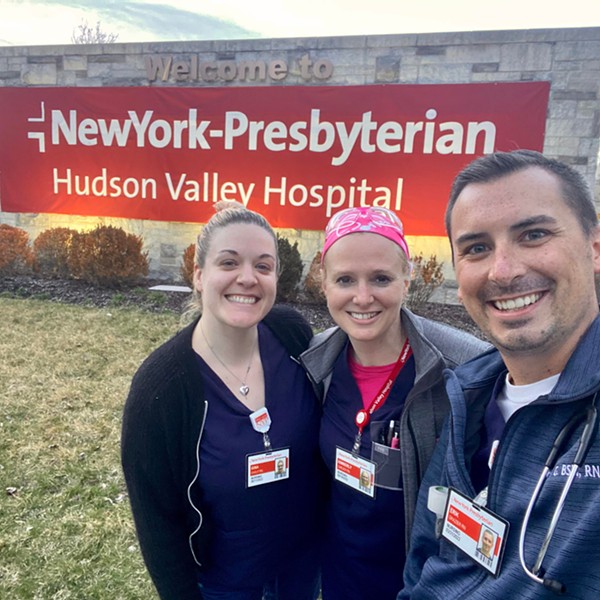This year, I won’t be spending the end of summer prowling the aisles at Target looking for the best deals on folders and pens. Also gone are the lazy days spent on playgrounds and in thrift stores with friends, the celebrating of important news (like getting to write this article) with a special dinner out, and the ability to visit family without 14 days in strict quarantine, a feat that requires so much self-discipline and planning that I sometimes jokingly wonder if a trained super spy could do it. And now the announcements from my school and the Governor’s office have started rolling in, making the realization undeniable: Summer is over and the world trudges on.
Though I might come across on paper as rather bitter about the subject of back to school, I’m actually grateful for how it worked out. I couldn’t have hoped for a better plan—with the exception of waking up tomorrow and realizing that the pandemic was a fever dream, the stuff of sci-fi movies. Students at my school, Onteora High School, will be allowed to choose if they want to do full-time remote learning or a hybrid model where they’re on campus one day per week starting in October (as of this writing). They won’t be penalized for not returning in-person.
This was the choice my family was waiting to hear with bated breath, because it’s really the only one that works for our life. At the beginning of the pandemic, we took the precautions necessary to see family, since some of our closest family members are at high risk of contracting the coronavirus. This means a 14-day quarantine: no takeout, no grocery shopping, no drives around town, nothing, before each visit. If my brother and I were forced back into school, then a strict quarantine would have been impossible, and all visits would have to stop. Additionally, if we returned to school, it would be much harder to keep ourselves safe, since we would be in close quarters with many others, including mask and corona deniers.
Based on these facts and fears—fears shown to be justified as schools navigate reopening across the country—my family decided that I wouldn’t be able to go back. The decision-making process was fraught, but family and safety had to come first. Now that Onteora has declared that all classes during the month of September will be online for everyone, the situation has changed slightly, but our feelings haven’t. It has put the need to make a choice on the back burner, but that doesn’t matter much to me personally, since I knew which of the options offered by the school I would take as soon as we found out about them.
My personal feelings and the changes to the school’s plan have made the upcoming months hard to imagine. Despite my general positive feeling for the way this school year is working out, and certainly my gratitude for this best-of-all-possible-options plan, I’m still preemptively mournful for the junior year I could have had. Plus, nothing feels assured. As soon as one decision is made, something changes, and on and on it goes. During this pandemic, good news never seems to come unaccompanied by bad; the TV and newspaper news is always terrible, and the end is nowhere in sight. It sometimes feels impossible to swim to shore without being drowned by another wave. Just when I start feeling like the election is the light at the end of the tunnel, and as soon as Joe Biden’s inauguration is over the cases will start dropping, I get a text from his campaign telling me that Trump just outraised him by $25 million. Just when I think I’m about to be able to hang out with a friend, I see them posting on their Instagram stories about hanging out with other friends or leaving the state, meaning for the safety of my own family, I have to cancel our plans.
The hopeless and cyclical nature of the pandemic adds to the stress of daily life. My school is a cauldron of political tension. It’s located in a district that is about half-Democrat and half- Republican, and political views have become a big part of the identities for me and my peers as we get older, so political debates are frequent, and it often feels like school is a constant battle between the two sides. So it wasn’t like school was ever an escape from our crazy world, but certain parts were. The school’s Gay-Straight Alliance was a safe place for the younger LGBTQ members of the school community, and, as a club officer, I was going to spend the 2020-21 academic year working to make sure that it stayed that way, despite the best efforts of some of the more bigoted students. The school newspaper allowed hard-hitting journalism that I’ve never seen in a comparable paper before, which made me feel like I was a part of something important, and it put me on the path to looking at journalism as a career. My friends never fail to make me feel understood and loved; they distract me from the world when I need an escape or let me talk out my feelings when that’s what I need. They let me be myself. They are some of the most hilarious, generous, and kind people I know. But now, all those things I love have been stopped or dramatically altered.
A thing this pandemic has made me realize about myself: I’m more extroverted than I thought. I have missed my friends and the mundane small talk with teachers, waiters, and cashiers more than I ever thought I would. I’m ambitious, anxious, and a wannabe over-achiever, so my work-life balance is basically nonexistent (flashbacks to pre-COVID, when I’d be frantically flipping through flashcards for the next day’s Spanish test while going to grab a quick dinner and see a movie with a friend despite knowing I’ll be at school until 10 or 11pm the next day for play rehearsal). Knowing this about myself, I figured the mandatory relaxation from no more after-school activities, even having my social life taken away from me, and being able to largely set my own school schedule would be a good thing. It was, for about a month. Then I missed normal life. I was hoping that I would be going back to school as usual, up until embarrassingly close to the time we learned we were not.
My dominant feeling during the countdown to the first day of school has been frustration. I try to throw myself into hobbies; I’ve taken up embroidery and earring making. I read articles and books about how to be antiracist. I rewatch shows I haven’t seen in years. I dump all my letter beads, bought at a craft shop during my first and only venture into a store since March 13, out onto the bed and play Scrabble with them, an unrepentant time suck. I make Spotify playlists with steadily more nonsensical and specific names. This is my pandemic. It’s confusing, at times painful, at times revealing fleeting and fun moments.
In addition to my inner turmoil about school and the pandemic in general, I’m watching the reactions of the whole country. Students have returned to campus to find that their colleges are unprepared to take care of them. NYU has become a bit of a public joke in recent weeks as students document their pitiful food situation on the social media app TikTok. Another TikTok user I follow has started making COVID college bingo, documenting all the things that could possibly go wrong on campuses as school resumes. They check off boxes almost daily as schools report their various problems. On all my social media accounts, I see the uproar against these educational institutions and also the jokes. Gen Z, in my experience, can make a joke out of anything, even potential death.
In balancing my own desires with the news of how the outside world is dealing with these unforeseen complications, and the reactions of everyone around me, I have come to feel that students cannot safely be sent back to school.
When I say this online, grown men in the comments section of some Twitter post often try to educate me (although a better word might be “berate”), saying that I’m only saying that because I don’t know how the economy works, I’m being soft, a snowflake. What, do you think we should just print more money, too? In a way, they’re not wrong. I don’t understand all the implications of keeping schools closed, and I know it’s more than a simple question of safety.
But still, I can’t stand to see students, quarantined at college, terrified of the virus and angry at their schools for treating them like their tuition money is more important than their lives. I can’t stand to talk to my friends about the topic. Even though we’re teenagers, an age group known for being selfish and prioritizing themselves, we are resigning ourselves to a semester in solitude because we need to worry about the danger our loved ones will face if we go back. So much fear and misinformation is being spread that I think all we can do is have empathy—and hope that the institutions and leaders that govern us have some, too. Students should not be sent into an unsafe environment, and I can’t think of ways to ensure that school would be safe. I can name several dozen people at Onteora High off the top of my head who are mask and corona deniers; how can we ensure that they try to keep their fellow students safe? A quick removal of a mask and a taunting sneeze—and someone is exposed.
And school is already a hot seat for illness, so returning in the midst of a public health crisis will only make the spread of illnesses harder to control—yet also more necessary than ever. In short, there are too many uncontrollable variables associated with returning. And, in my opinion, students are being made to return for the wrong reasons: not because it’s safe, but to protect the economy or to rush the world back to the way it was, even though we’re not ready.
Though I desperately want life to be normal again, I can’t condone actions being taken to force it to be like that. Viruses don’t listen to governments. I want everyone to be able to feel safe, to know that they’re more than a cog in a machine run by a corrupt leader who has mishandled this pandemic at every turn. I want this pandemic to make us appreciate teachers, who are doing everything they can and then some for their students. I want everyone’s safety to be prioritized by the education system.
So what does the first day of school mean to me? It means acknowledging that this isn’t coming to an end anytime soon. It means I’m going into my most important year of high school isolated, stressed, and unprepared. It means that this year will be one of constant innovation, as I try to get my clubs, grades, and relationships to a good place via email and terrible-quality webcam meetings. My pandemic is one of contradictions. I want to start school, because I like learning, and I work best with pressure and deadlines—which is sort of high school’s jam—but I’m scared for the seemingly endless list of ways this year could be hard or messy. I want to start school normally but I don’t think we should be able to.
But I will try my best and take what comes at me.
I’ll give “back to school” a new meaning, and always remember summer 2020.




















